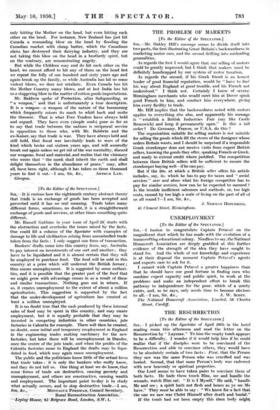' [To the Editor of the SPECTATOR.]
SIn_:It is curious how the eighteenth century abstract theory that -trade is an exchange of goods has been accepted and perverted until it has no real meaning. Trade takes many different forms, sometimes, no doubt, it is a straightforward exchange of goods and services, at other times something quite different,
Mr. Russell Gubbins in your issue of April 26; starts with the abstraction and overlooks the issues raised by the facts. One could fill a column of the Spectator with examples of damage to life and civilization arising from uncontrolled trade taken from the facts : I only suggest one form of transaction.
Bankers' drafts come into this country from, say, Australia to pay interest on investments of one sort and another ; they have to be liquidated and it is almost certain that they will be employed to purchase food. The food will be sold in this country at a price which will undercut the British farmer ; thus comes unemployment. It is suggested by some authori- ties, and it is possible that the greater part of the food that we might grow with advantage comes in as a result of these and similar transactions. Nothing goes out in return. If so, it creates unemployment to the extent of about a million agriculturists. This suggestion is supported by the fact that the under-development of agriculture has created at !mit a million unemployed.
It is *no doubt true that the cash produced by these internal sales of food may be spent in this country, and may create employment, but it is equally probable that they may be invested in competing industries in other countries, jute factories in Calcutta for example. There will then be created, no doubt, some initial and temporary employment in England in the engineering trades making machinery for the new factories, but later there will be unemployment in Dundee, once the centre of the jute trade, and when the profits of the Calcutta 'factories come to England the drafts may be liqui- dated in food, which may again cause unemployment.
The public and the politicians- know little of the actual form that trade takes : it is only the bankers who really know, and they do not tell us. One thing at least we do know, that some forms of trade are destructive, causing poverty and unemployment, and others are constructive, causing wealth and employment. The important -point to-day is to study what actually occurs, and to stop destructive trade.—I am,
8/31, Sce., MCiNTAGT:E FORDHA3d, COIIIICil SeCTetaiy,
'' • ' Rural Reconstruction Association. -- Leplirrflouse,- Beigrare Road, London, S.W. 1.






































 Previous page
Previous page